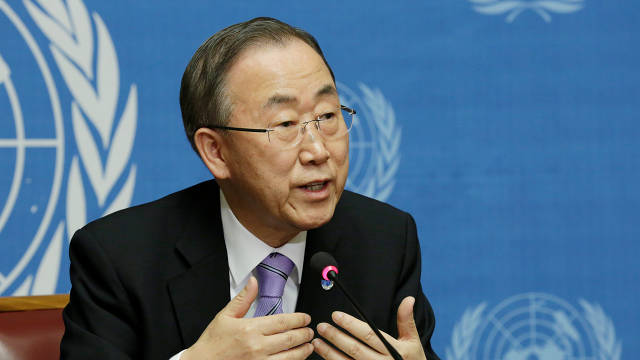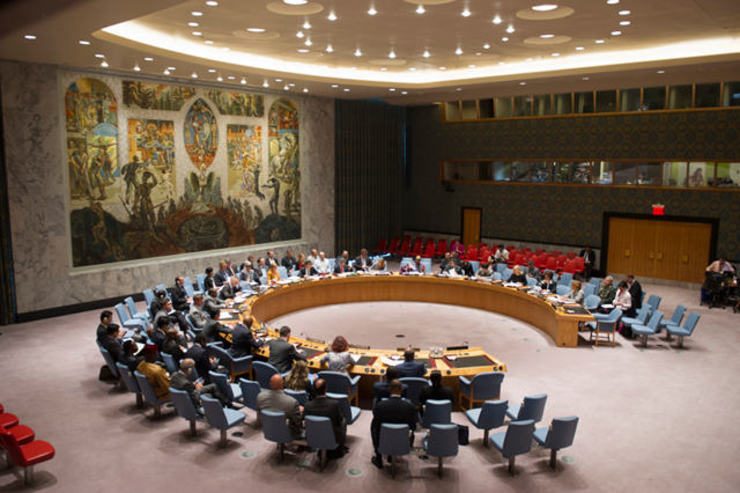SUMMARY
This is AI generated summarization, which may have errors. For context, always refer to the full article.

UNITED NATIONS – Will the head of the United Nations (UN) support the Philippines’ call to review peacekeeping guidelines after a controversial standoff with Syrian rebels?
This is a key question ahead of a meeting between UN Secretary-General Ban Ki-Moon and Philippine Foreign Affairs Secretary Albert del Rosario at the UN headquarters in New York City next week about Manila’s proposal to revisit “operational and tactical issues” concerning the deployment of peacekeepers to the Golan Heights.
Ban’s spokesman, Stéphane Dujarric, said the UN chief’s position is included in a report Ban submitted to the UN Security Council on Friday, September 12, about the peacekeeping mission officially known as the UN Disengagement Observer Force or UNDOF.
“The Philippines [has] already announced that they would withdraw their troops at the end of their term of duty. I’m sure the status of the Philippines’ contribution to the UN peacekeeping department will be one of the agenda items discussed in the bilateral meeting with the Secretary-General,” Dujarric said in a press briefing on Friday.
Asked by Rappler whether or not Ban is willing to recommend to the Security Council a review of UNDOF’s mandate, the spokesperson responded, “UNDOF will be discussed in the Security Council very soon. The report is on its way to the Security Council members. I don’t want to preempt the report, which will be made public.”
The meeting between Ban and Del Rosario is scheduled on the same week the UN Security Council will hold consultations on September 18 about UNDOF, tackling the report of the Secretary-General.
Del Rosario sought the meeting with Ban as UNDOF’s mandate came under scrutiny after Syrian rebels including the Al Qaeda-linked Al Nusra Front held 45 Fijian peacekeepers captive, and engaged in a firefight with Filipino peacekeepers. The Filipinos managed to escape the crisis that began on August 28.
Controversy surrounded what the Philippines called “the greatest escape” after Filipino military officials said that the troops defied the order of UNDOF’s Indian commander, Lieutenant General Iqbal Singh Singha, to surrender their weapons.
Singha in turn said in media interviews that the Filipinos’ defiance endangered the lives of the Fijians, calling their escape an “act of cowardice.” Ban’s Undersecretary-General for Peacekeeping Operations, Hervé Ladsous backed Singha, and denied that the commander ordered the Filipinos to lay down their arms.

Outdated, unclear mandate?
The incident highlighted questions about the viability of UNDOF’s mandate, with peacekeepers facing growing threats from Syria’s 3-year-old civil war. Last year, Syrian rebelsseized Filipino peacekeepers twice. Another Filipino peacekeeper was wounded by shrapnel from fighting between the rebels and Syrian forces.
The UN Security Council set up UNDOF in 1974 to supervise the implementation of a ceasefire between Israel and Syria after the 1973 Yom Kippur War. The disengagement agreement provided for an area of separation and for two equal zones of limited forces and armaments.
In his letter to Ban, Del Rosario said the Philippines “strongly proposes” a review of the UN’s command, accountability of mission leaders, and contingency plans in relation to the safety of peacekeepers during kidnapping and siege incidents.
“All peacekeepers have had to contend with the threat of (Syrian rebels), not envisioned in the original mandate and parameters of the UNDOF, and quite frankly, we all have to struggle to meet the demands of this challenge,” Del Rosario said.
Former Philippine Defense Secretary Gilberto Teodoro Jr said the UN lacks “a clear policy and plan of action in the area.”
“The inquiry should be as to what the instructions of Singha’s superiors were, or conversely, if UNDOF was left to fend for itself. Singha may be at fault but he is also taking the rap for a UN Security Council and a UN hierarchy which has clearly been the proximate cause of the Filipino soldiers’ plight in this case,” Teodoro commented on Rappler.
The Philippines is pulling out of the Golan Heights in October, a year after it first raised the need for the UN to provide full troop strength, enough equipment, and allow a 6-month rotation as conditions for staying on.
Austria, Japan and Croatia have also pullet out their troops from UNDOF because of the deteriorating security situation, and spillover from the Syrian war.
Despite the criticism, Ban’s spokesman said UNDOF’s mandate is still viable and the peacekeeping mission will continue to support this.
‘Golan should serve as a warning’
The Philippines is among the top troop-contributing countries to the UN, ranking 33rd out of 123 countries. UN data show that Manila has a total of 672 military and police contributions to the world body as of August 13, 2014.
In an article on TIME, writer Adam McCauley said the events in the Golan Heights must serve as a warning on the collective threat of modern conflicts. He said it is often developing countries like the Philippines and Fiji that shoulder the “stiffest burden” when the UN asks the international community to act in times of crises.
“Modern conflicts involve combatants whose ends are not merely the control of territory or the monopoly of politics. They wage war with their own rules, without concern for the U.N.’s mission to referee….Peacekeepers are redundant where there is no peace to keep.”
Philip Cunliffe, Senior Lecturer in International Conflict at the University of Kent and author of Legions of Peace: UN Peacekeepers from the Global South, also stressed the need to rethink peacekeeping missions, with troops from developing countries in the frontlines of “obscure missions in forgotten wars around the world.”
“Next time the cry goes up among the Western chattering classes that ‘something must be done!’ in response to a humanitarian crisis or conflict, it is worth recalling that that ‘something’ we are talking about will likely depend on other countries’ soldiers acting on our behalf.’” – Rappler.com
Rappler multimedia reporter Ayee Macaraig is a 2014 fellow of the Dag Hammarskjöld Fund for Journalists. She is in New York to cover the UN General Assembly, foreign policy, diplomacy and world events.
Add a comment
How does this make you feel?
There are no comments yet. Add your comment to start the conversation.